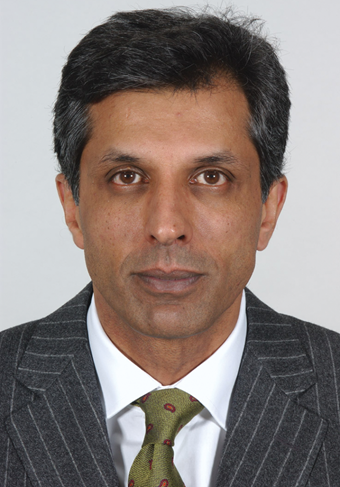The European Academy of Otology and Neuro-otology (EAONO) will hold its 2020 meeting in London. Haroon Saeed, Specialist Trainee in ENT, asked Professor Shakeel Saeed, EAONO President, about the upcoming event.

Professor Shakeel Saeed
In a nutshell, what is the EAONO all about?
Since its inception, the main EAONO ethos is to drive medical education. As an academy it is our desire to ensure we disseminate the most relevant, cutting edge knowledge not only to the current generation of otologists but also to the upcoming generation. It has been a longstanding belief of mine that as academic clinicians, we have a responsibility to ensure effective knowledge transfer to ultimately arm us all with the tools to care for our patients and their families to the best of our abilities. In addition, EAONO strives to ensure knowledge transfer is through high quality science and evidence, from discovery through to translation, through to outcomes. The mission statement of the EAONO is essentially to personify the definition of an academy: ‘A society or institution of distinguished scholars and artists or scientists that aims to promote and maintain standards in its particular field.’
In addition, EAONO is instrumental in developing consensus documents and guidelines for best practice in key areas as well as a validation process through the trans-European dissection course project. This is implemented through our executive, teaching, research and congress working groups, drawing on a huge wealth of experience in our field.
As EAONO President, what is involved in organising such a prestigious meeting, and what have been the specific challenges so far?
I was honoured to be elected as EAONO President in 2018. This peer-recognition means a lot to me. It is of course the president’s role to build upon the success of previous meetings. There is a huge responsibility to ensure a high calibre academic conference is conceptualised, planned, developed and implemented during one’s tenure. To give an idea of the timeframes involved in tackling such a task I began planning the meeting in Autumn 2018 and it is only now that plans are finally coming together! I was able to draw upon my previous experiences as Academic Chair of BACO 2015 and set about to find an appropriate affordable venue in London whilst also compiling a local organising committee and UK scientific committee. I think it has been very important to collaborate with professional conference organisers that have a proven track record and ensure that a schedule has been laid out well in advance. The key challenge has been to decide how we can build on previous meetings but also bring something new to the conference as well as attract more trainees and younger practising ENT surgeons.
Is there a theme for the 2020 conference?
Our over-arching theme will be showcasing up and coming otologists from Europe and beyond. For the first time, the instructional sessions will be a dual presentation from a leader in the field and a younger colleague / fellow / resident in the same department. This is a departure from previous meetings and will hopefully be well received. I’m hoping this theme will generate an air of enthusiasm amongst the young otologists present, thus maximising on our opportunity to inspire young clinicians and researchers through the academy.
What can delegates expect and why should they come?
Delegates will realise that the meeting has been designed to emphasise quality and quantity. Feedback received from previous international meetings has highlighted that larger conferences often leave delegates feeling that the academic sessions and presentations are spread too thinly. This can lead to the dilution of audiences at specific talks and reduce the feeling of cohesiveness and collectiveness during the meeting. I’ve aimed to resolve this by organising a meeting which will run across three days, but with fewer parallel sessions than usual to ensure a good audience for all presentations. I have confirmed three keynote speaker sessions which are truly plenary, and we are developing panel discussions which will address the pertinent clinical issues of the day. The instructional sessions will emphasise quality and of course, there will be ample opportunity for trainees to present their work through oral and poster formats.
What advice would you give to colleagues wishing to get involved with the EAONO
The EAONO is the only pan-European academic society representing all that is good in our sub-specialty. The quality of this representation has therefore led to executive representation at The Confederation of the European Otorhinolaryngology and Head & Neck Surgery. This is an extremely important voice that helps inform pan-European clinical, educational and research standards. On this basis I would strongly urge both consultants and trainees to firstly join the EAONO, embrace its mission statement and help us drive the quality of care for patients across Europe and beyond. At a time when many countries have become somewhat inward-looking, it has never been more important to rise to the challenge of maintaining pan-European education and solidarity! My message to our younger colleagues is that the EAONO encourages you to showcase your clinical or discovery science work at our conference and at the same time utilise the opportunity to meet your peers and leaders in our field both past and present.
Save the Date: EAONO 2020 (European Academy of Otology and Neuro-Otology)



